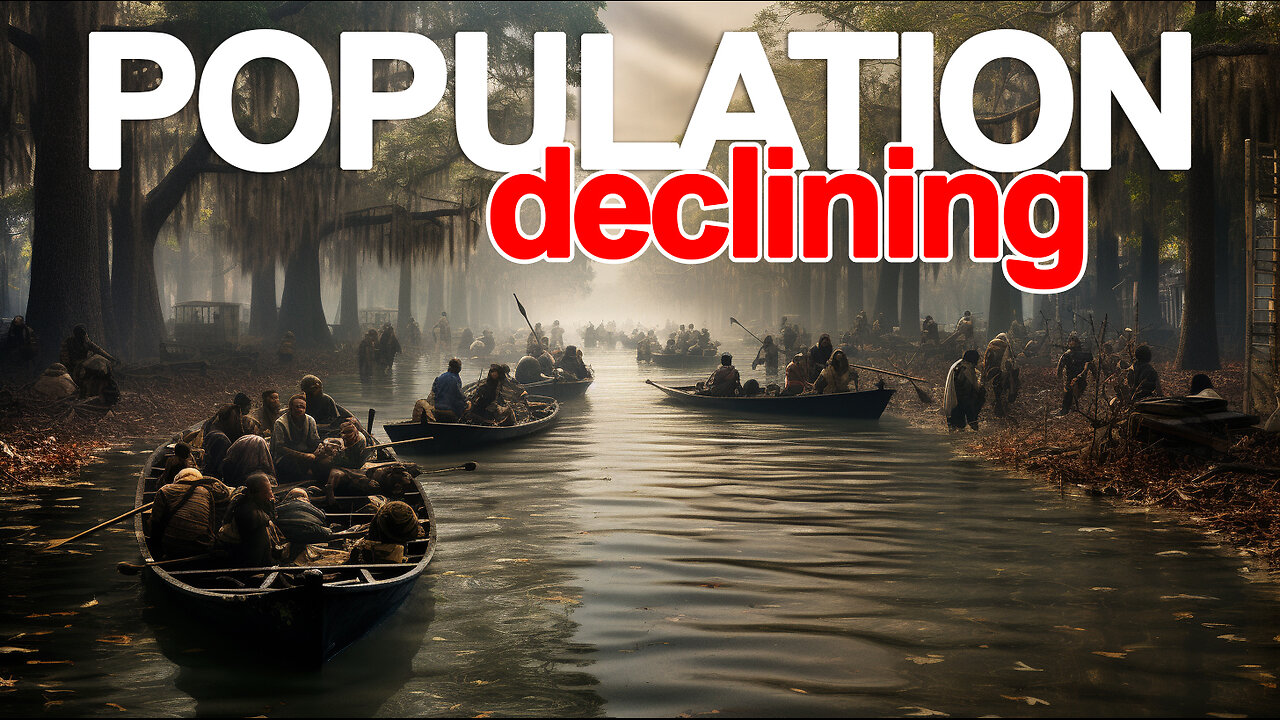Premium Only Content

Why Louisiana's Population is Declining?
Why Louisiana's Population is Declining? Obviously there are a combination of factors, let's find out!
Climate Issues.
Louisiana's location in the Gulf of Mexico makes it vulnerable to the Atlantic hurricane season, which runs from June 1 to November 30. Over the years, Louisiana has been hit by numerous hurricanes, causing extensive damage to property and infrastructure, as well as loss of life.
One of the most devastating hurricanes to hit Louisiana was Hurricane Katrina in 2005, which made landfall as a Category 3 storm with winds of 125 mph. The storm surge caused breaches in the levee system and flooding in New Orleans, resulting in more than 1,800 fatalities and $161 billion in damages. The disaster led to widespread criticism of the government's response and exposed weaknesses in the city's infrastructure.
In addition to Katrina, other major hurricanes that have hit Louisiana in recent years include Hurricane Rita in 2005, which made landfall as a Category 3 storm with winds of 115 mph, causing $18.5 billion in damages, and Hurricane Gustav in 2008, which made landfall as a Category 2 storm with winds of 110 mph, causing $4.3 billion in damages.
Louisiana's coastal communities are particularly vulnerable to the effects of hurricanes, as rising sea levels and subsidence continue to increase the risk of flooding and erosion. In recent years, hurricanes such as Harvey, Irma, and Maria have brought attention to the vulnerability of coastal communities across the United States.
Rising Sea Levels.
Another reason why people may be hesitant to move to Louisiana is the threat of rising sea levels caused by global warming.
Louisiana is a coastal state that is particularly vulnerable to the effects of climate change, including the loss of land due to erosion and subsidence, and the increased frequency and intensity of storms and hurricanes.
According to the National Oceanic and Atmospheric Administration, sea levels along the Gulf Coast have risen by over 8 inches since 1950. In some parts of Louisiana, the land is sinking at a rate of one inch per year. This means that areas that were once above sea level are now at risk of being permanently flooded.
The effects of rising sea levels are not just limited to the physical landscape. They also have the potential to devastate Louisiana's economy, which is heavily reliant on industries such as oil and gas production, shipping, and fishing. The loss of coastal land and infrastructure could also lead to significant disruptions in transportation, energy, and water systems.
In addition, the increased flooding and storm surges that come with rising sea levels pose a threat to public health and safety. They can contaminate water supplies, damage homes and businesses, and displace residents from their communities.
Healthcare.
he healthcare situation in Louisiana is a cause for concern for both current residents and potential newcomers. The state has been grappling with financial issues in its healthcare system for years, leading to decreased access to care and poor health outcomes for many. The problem is compounded by the fact that Louisiana has one of the highest rates of uninsured residents in the United States.
According to a report by the Kaiser Family Foundation, as of 2019, Louisiana had a 13.9% uninsured rate among its population. This is significantly higher than the national average of 9.2%. The lack of insurance coverage can result in many people avoiding or delaying medical treatment, which can lead to more serious health issues down the line.
The situation is made worse by the state's budget cuts in recent years. In 2018, the Louisiana Department of Health had to cut $46 million from its budget, resulting in the closure of several healthcare facilities and the loss of jobs for healthcare workers. The cuts also led to a decrease in Medicaid coverage for some residents.
The healthcare issues in Louisiana have been further exacerbated by the COVID-19 pandemic. The state has been hit hard by the virus, with a high number of cases and deaths. The strain on the healthcare system has been immense, with hospitals overwhelmed and healthcare workers pushed to their limits.
Before moving forward, make sure you subscribe to Top Things To Know so you don't miss out on more videos like this!
Political Issues.
The political issues in Louisiana have been ongoing for many years, with a long history of corruption and scandals involving public officials. These scandals have included bribery, embezzlement, and misuse of public funds. As a result, there is a sense of disillusionment and mistrust among the residents towards the government and politicians.
The impact of political corruption on Louisiana has been significant. One of the consequences is the lack of investment in the state, which has hindered economic growth and job opportunities. Investors are hesitant to invest in a state with a reputation for corruption, and this has led to a decline in business and industry.
The political issues have also had a negative impact on public services, such as education and healthcare. The education system in Louisiana has been underfunded and understaffed for many years, leading to low graduation rates and a lack of qualified workers. The healthcare system has also suffered due to budget cuts and mismanagement, leaving many residents without access to basic healthcare services.
The culture of mistrust and disillusionment has also led to low voter turnout, with many residents feeling that their vote does not matter. This perpetuates a cycle of corruption and disempowerment, making it difficult for positive change to occur.
Decline in Industry.
The decline in Louisiana's industrial sector has been a major factor in the state's economic struggles. In the past, Louisiana was known for its thriving manufacturing industry, particularly in the petrochemical and oil industries. However, in recent years, many of these industries have been hit hard by changes in the global economy and environmental regulations. As a result, many manufacturing plants have closed or relocated, resulting in significant job losses for the state's residents.
The decline in Louisiana's industrial sector has also had a ripple effect on other industries, such as transportation and logistics. Without a strong manufacturing base, these industries have also struggled to find stable footing. This has resulted in a stagnation of economic growth and a sense of hopelessness among many residents.
While the state has made efforts to attract new businesses, progress has been slow. Some blame this on the state's outdated tax system and lack of investment in infrastructure. Others point to the state's reputation for political corruption and its struggles with natural disasters as additional deterrents for potential investors.
Despite these challenges, Louisiana has many assets that could make it an attractive destination for businesses, such as its proximity to major transportation hubs, abundant natural resources, and a skilled workforce.
High Cost of Housing.
The high cost of housing is a major concern for many Louisianans, especially those living in larger cities like New Orleans and Baton Rouge. According to recent data, the median home value in Louisiana is around $170,000, which is slightly below the national average. However, the cost of living in some of the state's urban areas is higher than in many other parts of the country, which can make it difficult for some residents to afford basic necessities like rent and utilities.
One of the factors driving up the cost of housing in Louisiana is the high demand for rental properties. In cities like New Orleans, where tourism is a major industry, landlords can charge premium prices for short-term rentals, leaving fewer options for long-term renters. Additionally, many Louisianans who were displaced by Hurricane Katrina in 2005 continue to struggle to find affordable housing, as the storm destroyed many homes and forced people to relocate.
The high cost of housing in Louisiana also affects people who are looking to buy a home. For many working-class families, the dream of homeownership is out of reach, as the cost of a mortgage payment can be prohibitively high. As a result, many people are forced to continue renting, which can be a major financial burden over time.
Lack Of Jobs.
The lack of jobs in Louisiana has been a persistent issue for many years. Even with the state's efforts to attract new businesses and industries, the unemployment rate has remained high. This is particularly evident in some of the state's rural areas, where there are limited job opportunities.
One of the contributing factors to the lack of jobs is the decline in the state's industrial sector, which has historically been a major employer in Louisiana. Many of the state's traditional industries, such as oil and gas, have seen a decline in recent years, resulting in a loss of jobs for many residents.
In addition to the decline in traditional industries, the state has also struggled to attract new businesses and industries. Many companies are hesitant to invest in Louisiana due to the state's reputation for political corruption and economic instability.
The lack of jobs has a ripple effect on the economy and the overall well-being of the state. Without steady employment, many residents struggle to make ends meet and are unable to contribute to the state's economy. This, in turn, can lead to a decline in the quality of life for many Louisiana residents.
-
 DVR
DVR
Bannons War Room
1 year agoWarRoom Live
101M -
 5:42:36
5:42:36
FreshandFit
11 hours agoLive X Censorship For Opposing Immigration?!
107K75 -
 1:08:16
1:08:16
Tactical Advisor
6 hours agoNEW Budget Glocks | Vault Room Live Stream 011
39.2K4 -
 16:30
16:30
SNEAKO
13 hours agoNO FRIENDS IN THE INDUSTRY.
89.4K19 -
 6:19
6:19
BlackDiamondGunsandGear
1 day agoHow Fat Guys can Appendix Carry
60.5K4 -
 6:58
6:58
Gun Owners Of America
1 day ago2024 Was Huge For Gun Rights, Here's Our Top 10 Wins!
50.9K2 -
 15:50
15:50
Degenerate Jay
1 day ago $2.02 earnedJames Bond Is Being Ruined By Amazon? Make Him A Black Gay Woman?
37.8K10 -
 15:18
15:18
DeVory Darkins
1 day ago $16.60 earnedTrump Drops NIGHTMARE Warning on Joe Biden
52.7K98 -
 36:13
36:13
The Why Files
1 month agoAlien Implants Vol. 1: Devil’s Den UFO Encounter: What Was Found Inside Terry Lovelace?
78.7K40 -
 9:03
9:03
Alabama Arsenal
1 day ago $0.71 earnedAAC HUB 2K | Modern Features, Iconic Classic Looks
17.8K1